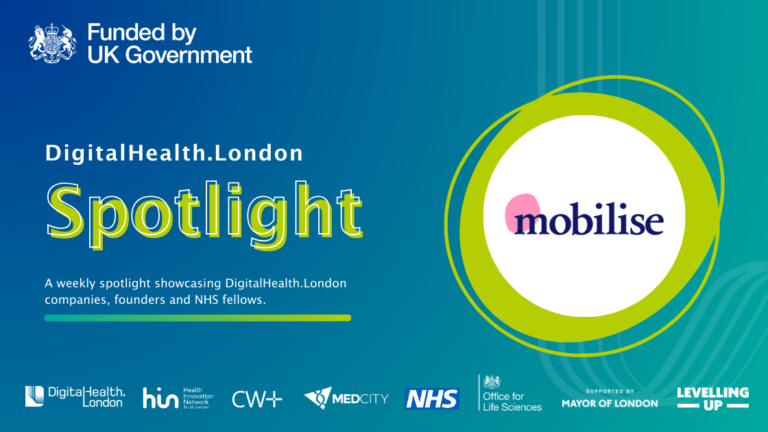Each week we spotlight one of our DigitalHealth.London businesses, founders or NHS fellows. Today we are excited to introduce Mobilise, our current accelerator company DigitalHealth.London.


What challenge are you facing and why is it important?
There are more than 10.5 million unpaid carers in the UK who look after a family member or friend. Without early preventative support, caregivers can quickly reach burnout, with often devastating consequences for their families.
What is the solution you have developed and how can it help solve the problem?
Mobilize is a digital support service for unpaid caregivers. We use online tools to create a community of caregivers sharing the practical wisdom and emotional support that makes a difference in a caring role.
Using sophisticated digital marketing techniques, we can proactively reach out to caregivers early in their journey. 80% of caregivers on the Mobilize platform have never had access to any support for their role as caregiver.
By reaching carers as early as possible and providing accessible support in a way that suits them, we can build resilience and dependency, helping local authorities meet their statutory obligations and empowering carers to prosper.
What is the history of your company?
Mobilize was created during the Covid-19 pandemic when the co-founders James Townsend And Suzanne Bourne saw the need for carers to share practical advice when dealing with the acute challenges of caring for someone during lockdown.
As the informal community began to grow, Mobilize was commissioned by Shropshire Council and the London Borough of Camden to provide support to carers in their borough. Since then, Mobilize has worked in over 50 settings across the UK and grown the community to over 80,000 carers.
What successes have you had so far through successful pilots/trials/contracts?
Initial pilots have enabled Mobilize to reach a significant number of caregivers with accessible support, including 26,000 caregivers in Camden. 80% of caregivers who access the platform have never accessed support for their caring role, and 79% see progress in building their resilience in just a few weeks.
What are your future goals? What does success look like?
Our goal is to radically transform what is possible in terms of supporting caregivers. Currently only 10-15% of carers in the UK have access to support, and we would like to see this rise to 85-90%.
In building the Mobilize community, we want to leverage the fantastic wisdom, knowledge and expertise of so many experienced caregivers, so that together we can care and thrive.
How has your time at the DigitalHealth.London Accelerator helped you achieve these goals?
It’s been great to connect with so many other companies doing exciting things in the world of health and care, learning about the specific challenges commissioners face and how our platform can help them to lead the transformation in their districts.
Do you have any advice for future digital health companies?
Regardless of the potential of your technology, the most important question is: how will it help solve a problem for my user?
It’s easy to get excited about a theoretical opportunity, but if it doesn’t solve a problem for a real person, it won’t go anywhere.
I would also say that “keep going” is really the key. This is important in terms of cash management of course, but also emotional energy! There are so many obstacles to overcome, but overcoming them one at a time and continuing is the key to making great progress.
Any requests for the public?
If you know someone who has experience caring for someone and might be able to contribute to our wisdom community, send them to us at www.mobilise.co.uk.
Mobilize is currently part of Cohort 7 of the DigitalHealth.London Accelerator program.
THE DigitalHealth.London Accelerator The program is funded by the UK government through the UK Shared Prosperity Fund (UKSPF). It is delivered by the Health Innovation Network (HIN) South London in partnership with the Office of Life Sciences, CW+, Medicity, NHS England, the Mayor of London and the Leveling Up Fund.
For more information, please visit https://www.gov.uk/government/publications/uk-
Shared Prosperity Fund prospectus.




